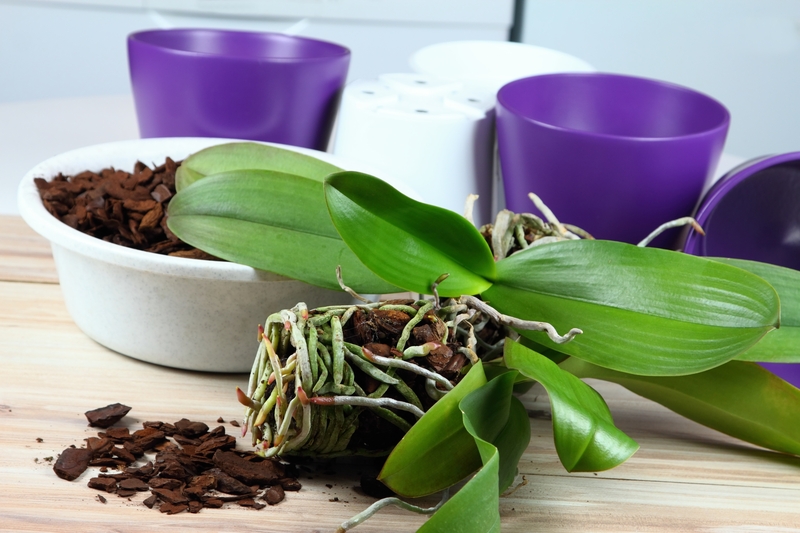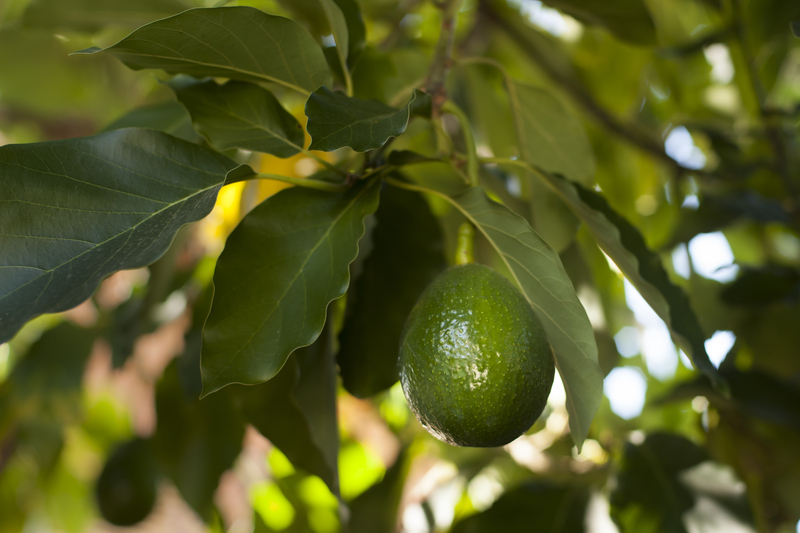Creating Fertile Landscapes with Organic Waste
Posted on 07/09/2025
Creating Fertile Landscapes with Organic Waste
Developing fertile landscapes that brim with life doesn't have to rely on artificial chemicals or expensive inputs. By harnessing the power of organic waste, gardeners, landscapers, and agricultural professionals can boost soil fertility, support plant health, and contribute to sustainable land management. This comprehensive guide will walk you through the key principles, techniques, and benefits of creating lush, productive landscapes using organic waste.
Understanding Organic Waste and Its Importance in Landscape Fertility
Organic waste is any biodegradable material that originates from plants or animals. This includes kitchen scraps, yard clippings, manure, and even some types of paper. Instead of seeing these materials as useless leftovers, we can view them as valuable resources that, when managed correctly, dramatically enhance the health and fertility of our landscapes.
The Role of Organic Waste in Soil Health
- Enriches soil with nutrients: Organic materials break down into vital nutrients like nitrogen, phosphorus, and potassium--essential for robust plant growth.
- Improves soil structure: Organic matter helps soils retain moisture and nutrients, increasing their ability to support healthy plant life.
- Boosts microbial activity: Soil organisms thrive on decomposing organic waste, creating a living soil ecosystem that cycles nutrients and supports plant roots.
- Reduces chemical dependency: By recycling waste, less reliance is needed on synthetic fertilizers and pesticides, making landscaping more environmentally friendly.

Types of Organic Waste for Fertile Landscapes
Creating fertile soils with organic waste starts with understanding what kinds can be used. Here are key sources commonly available:
- Kitchen scraps (fruit and vegetable peels, eggshells, coffee grounds)
- Garden waste (leaves, grass clippings, plant prunings)
- Animal manure (from herbivores, such as cows, sheep, horses, rabbits, and chickens)
- Wood chips and sawdust (from untreated, natural wood sources)
- Paper and cardboard (unbleached, shredded, and ink-free)
- Food industry byproducts (spent grains, pulps, etc.)
What Not to Use:
- Meat, bones, and dairy (these can attract pests and cause odors)
- Oily foods
- Heavily treated or painted wood
- Colored or glossy papers
- Pet or human waste (due to potential pathogens)
Composting: The Cornerstone of Fertility
Turning raw organic waste into rich compost is one of the most effective methods for increasing landscape fertility. Let's review what composting involves and how it benefits your land.
How Composting Works
Composting is the natural process where microorganisms decompose organic matter, transforming it into humus--a stable, nutrient-rich substance. This process can happen passively or can be fast-tracked through active compost management.
Composting Methods for Every Landscape
- Backyard Compost Piles: An open pile or bin where layers of organic materials are turned regularly to speed up decomposition.
- Vermicomposting: Using worms (typically red wigglers) to rapidly break down food waste into castings, which are an exceptional soil amendment.
- Trench Composting: Burying organic waste directly in the ground between plant rows or in empty beds.
- Bokashi: A fermentation-based approach that processes a broader array of kitchen waste, including some items not advisable in standard composting.
Tips for Effective Composting
- Balance "greens" and "browns": Mix nitrogen-rich materials (like kitchen scraps) with carbon-heavy materials (like dry leaves or wood chips).
- Aerate regularly: Turn your pile to supply oxygen for decomposers and prevent foul odors.
- Maintain moisture: Keep compost lightly moist (like a wrung-out sponge).
- Shred or chop materials: Smaller pieces break down faster than large chunks.
Using Organic Waste Directly in the Landscape
While composting is the gold standard, applying some types of organic waste directly can also improve soil fertility, build organic matter, and provide protective mulching. Here's how:
Mulching with Organic Residues
- Grass clippings: Spread thin layers under shrubs, fruit trees, or in garden beds (avoid thick mulch as it may mat and repel water).
- Leaf litter: Use autumn leaves to protect soil, suppress weeds, and eventually feed soil as they break down.
- Wood chips: An excellent choice for perennial beds and garden paths, wood chip mulch slowly decomposes and improves soil structure.
Sheet Mulching and Lasagna Gardening
These techniques involve layering organic materials directly on the soil surface. Common steps include:
- Remove or smother weeds with cardboard or newspaper.
- Add alternating thin layers of "greens" and "browns."
- Top with a thick mulch layer (straw, composted leaves, wood chips).
- Allow layers to break down naturally, transforming into fertile planting beds over time.
Sheet mulching is particularly useful for starting new gardens, reclaiming poor soil, or maintaining perennial beds.
Vermicomposting: Harnessing Worm Power
Vermicomposting is a fascinating way to turn food waste into high-value fertilizer. Worm castings ("vermicompost") are rich in nutrients and beneficial microbes. Setting up a bin (indoor or outdoor) with red wigglers can rapidly reduce kitchen waste and supply your landscape with an incredible natural amendment.
Benefits of Vermicompost for Landscapes
- Fast decomposition: Worms quickly process organic waste--even indoors!
- Microbial boost: Castings are teeming with beneficial bacteria and fungi.
- Plant growth stimulant: The hormones in worm compost can stimulate root and shoot development.
- No odor: Managed properly, vermicomposting produces little to no smell.
Spread worm castings around trees, add to planting holes, or brew them into compost tea for an organic fertilizer spray.
Manure Management for Fertile Landscapes
Animal manure is an ancient and effective organic waste for soil fertility. However, using manure safely requires knowledge:
How to Use Manure Safely and Effectively
- Age it first: Fresh manure can burn plants and harbor pathogens; composting before use is best.
- Use from herbivores: Cow, horse, sheep, and chicken manure are ideal. Avoid cat, dog, or human waste.
- Apply in the off-season: Incorporate manure in fall or early spring to allow time for breakdown before planting.
- Incorporate into the soil: Mixing it avoids surface runoff and improves nutrient uptake.
Creating a Closed-Loop Landscape System
The ultimate goal is to design a closed-loop system where the outputs of your landscape (leaves, weed clippings, food scraps) become new inputs for soil fertility. This mimics healthy natural ecosystems, reducing waste and resource dependency.
Steps to Building a Self-Sustaining Landscape
- Audit your waste streams: Identify all sources of organic waste on your property (kitchen, garden, animals, local businesses).
- Designate collection points: Use bins, holding areas, or compost tumblers for gathering materials.
- Choose processing methods: Compost, vermicompost, sheet mulch, or direct application based on materials available.
- Plan for seasonal needs: Stockpile dry leaves in fall for balancing "greens" in compost piles come spring/summer.
- Engage your community: Share surplus materials with neighbors or community gardens to keep nutrients cycling locally.
Benefits Beyond Fertility: Why Use Organic Waste?
Creating fertile landscapes with organic waste is about so much more than just lush growth. It provides broad environmental, economic, and social advantages:
- Reduces landfill use: Diverting organic waste prevents methane emissions from landfills.
- Builds resilient soils: Organic-rich soils retain more water and resist erosion--even in drought.
- Enhances biodiversity: Healthy soils support fungi, insects, and other wildlife.
- Mitigates climate change: Carbon stored in soil organic matter helps fight global warming.
- Generates cost savings: Less need to purchase fertilizers or manage large waste removal.
- Provides educational opportunities: Composting and organic land management can teach valuable lessons to children and communities.
Overcoming Common Challenges
Creating fertile landscapes with organic waste does come with its set of challenges for beginners. Here's how to overcome the most frequent obstacles:
- Odor problems: Usually due to too much moisture or insufficient airflow--mix in more dry "browns" and turn the heap regularly.
- Pest attraction: Avoid using meat, dairy, or oily foods in compost. Properly cover food scraps within your pile or bin.
- Slow decomposition: Chop materials smaller, keep pile moist, and ensure a balanced mix of greens to browns.
- Space constraints: Try compact bins, vermicomposting, or even trench composting in small beds.
Expert Tip:
Start small and scale up as you become more comfortable. Even a single compost bin or worm bin can make a big difference in soil health!
Case Studies: Fertile Landscapes in Action
Urban Community Gardens
In cities worldwide, community gardens have transformed abandoned lots into fertile, productive spaces by composting neighborhood food and yard waste. These projects have increased green cover, supplied local food, and fostered community bonds--all using "waste" as the foundation.
Agricultural Transformations
Many farms regenerate depleted soils by incorporating cover crops, compost, and manure into their practices. Organic waste not only replenishes nutrients but also revives soil life, leading to increased yields and healthier crops over time.

Frequently Asked Questions about Creating Fertile Landscapes with Organic Waste
Can I compost weeds or diseased plants?
Most weeds can be composted if your pile gets hot enough (above 140?F) to kill seeds and pathogens. Avoid persistent roots or seed heads unless you're confident in your compost management.
How long does it take to see results?
Composting can take 2-12 months depending on conditions. Direct mulch or sheet mulching provides benefits immediately (as mulch) and over several months (as the layers decompose).
Are there alternatives if I don't want a compost heap?
Yes! Consider vermicomposting indoors, trench composting, or donating your kitchen waste to a local garden or farmer who can use it.
Conclusion: Transform Waste into Wealth
Creating fertile landscapes with organic waste is accessible, rewarding, and environmentally responsible. Whether you're a home gardener, professional landscaper, or community organizer, using organic waste can turn poor soils into living, productive ecosystems. Start small, build your skills, and share your success--together, we can create a world where all landscapes are teeming with natural fertility rather than filling up landfills.
Ready to enrich your landscape? Gather your organic waste and let nature do its magic!
Latest Posts
Architectural Elegance in Vertical Gardening
Igniting Your Passion for Home Herb Cultivation
Create an Enviable Garden Without the Hassle
Building a Thriving Orchid Collection
The role of biodiversity in gardens to address climate change

